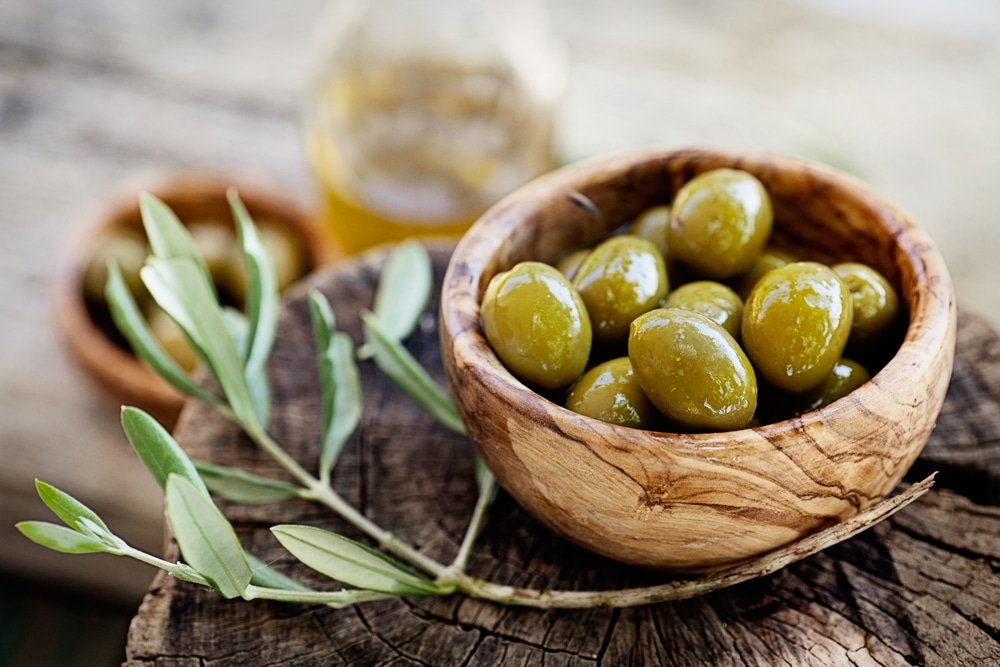Olives amazing health benefits include significant protection against cancer, keeping blood vessels healthy, relieving pain, supporting gut health, decreasing risk of developing diabetes, promoting weight loss, preventing infections, reducing likelihood of osteoporosis development, preserving brain function, reducing seasonal allergies, supporting eye health.
What are Olives?
Olives are among some of the healthiest fruits (yes, they are fruits) on the planet, associated with the Mediterranean regions. They are, in fact an important part of the Mediterranean diet, which is responsible for improved health and wellbeing. They may be small, but their importance cannot be overstated.
Olives grow on trees named oleo europaea, and belong to a fruit category known as stone fruits, including other members such as mangoes. They are typically green when unripe, and black when mature. However, there are ripe olives that remain green.
Olives seem to have originated in Northern Africa, following which they were and still are heavily cultivated primarily in the Mediterranean regions of Italy and Greece. They remain and integral part of the daily cuisine of the locals there, with people of the Mediterranean consuming 300% more olive oil than people living in the Western hemisphere.
Nutritional Value of Olive (per 100g serving)
Here is a chart showing the nutritional value of olives per 100 grams:
| Nutrient | Amount per 100g |
|---|---|
| Calories | 115 kcal |
| Water | 80.0 g |
| Protein | 0.84 g |
| Total Fat | 10.68 g |
| Saturated Fat | 2.28 g |
| Monounsaturated Fat | 7.89 g |
| Polyunsaturated Fat | 0.91 g |
| Carbohydrates | 6.26 g |
| Dietary Fiber | 3.2 g |
| Sugars | 0.54 g |
| Vitamin C | 0.9 mg (1% DV) |
| Vitamin A | 17 µg (2% DV) |
| Vitamin E | 3.81 mg (25% DV) |
| Vitamin K | 1.4 µg (2% DV) |
| Calcium | 52 mg (5% DV) |
| Iron | 0.49 mg (3% DV) |
| Magnesium | 11 mg (3% DV) |
| Phosphorus | 4 mg (1% DV) |
| Potassium | 42 mg (1% DV) |
| Sodium | 735 mg (31% DV) |
- Note: Percent Daily Values (DV) are based on a 2,000-calorie diet.
This chart reflects the nutritional content of olives, emphasizing their fat content, especially monounsaturated fats, and their contributions to dietary fiber, Vitamin E, and sodium.
11 Amazing Health Benefits of Olives

1. Offer Significant Protection Against Cancer
It is no mere coincidence that people living in the Mediterranean regions have some of the lowest cancer rates on earth, as much of this protection is attributed to their abundant use and consumption of olives and olive oil. Olives are loaded with phenolic compounds including squalene and terpenoid, potent anti-cancer agents. They are also loaded with Vitamin E, an anti-oxidant that is not given its fair share in the spotlight. Finally, its high content of monounsaturated fats help reduce inflammatory markers and shut down processes that could set cancer in motion.
2. Help To Keep Blood Vessels Healthy
One of the major risk factors of a cardiovascular event is the formation of atherosclerotic plaques on the blood vessel walls. Accelerated oxidation of LDL cholesterol contributed greatly to the formation of this plaque, but olives and olive oil help to stop this. Thanks to the presence of phenolic compounds, oxidation of this cholesterol is reduced significantly, keeping blood vessels clearer and free to the passage of blood. These compounds also promote blood vessel flexibility by preventing hardening of the endothelium.
3. Help To Naturally Relieve Pain
Olives are loaded with phytochemicals, among them being one called oleocanthal. This compound is a potent anti-inflammatory compound, being able to match the action and effect of many of the most powerful NSAID pain killers. This can make olives a powerful remedy for chronic inflammatory conditions, such as arthritis or following a workout. Consume a diet higher in olives in place of opting for a painkiller, and your health will love you for it!


4. Supports Gut Health
Regular consumption of olives and olive oil play an important role in supporting the health of our probiotic bacteria, by offering them energy necessary for their survival. Consumption is associated with improving colony size of many different probiotics, including Bifidobacterium, which help the body to produce natural anti-biotics.
5. Decreases Risk Of Developing Diabetes
Olives are extremely beneficial for anyone who may be diabetic, or at risk of becoming, having a naturally low glycemic index. For one, olives are rich in monounsaturated fats, which among other things can significantly slow down the speed of blood glucose absorption. But that’s not all it does to help diabetics, as consumption following diagnosis still has its role. Oxidative damage can run rampant in diabetics, hastening deterioration of organs such as the kidneys and eyes. The anti-oxidants found in olive oil, as well as the anti inflammatory nature of the fat, help ensure diabetic complications do not make the disease much worse than it already is.
6. May Promote Weight Loss
While overall caloric restriction is important to bring out measurable weight loss, eating healthy fats can greatly contribute to your goal. Monounsaturated fats are among the best fats to help mobilize free fatty acids, decrease inflammation associated with rapid fat oxidation, and promoting satiety as a whole. A hypocaloric diet is associated strongly with hunger pangs and cravings, a scenario that can be taken care of by ensuring you get enough high quality fats in your diet.
7. Help Prevent Infections
Many do not know this, but olives are actually excellent support for your immune system, as they can reduce the likelihood of you picking up infections of any sort, Whether that be bacterial, fungal or viral in origin. Olives have been used culturally for this purpose for a long time, including using the leaves to manage topical wounds and infections. Olives even show potential in inhibiting the growth of the devastating bacteria MRSA- a strain resistant to many common prescription anti-biotics.
8. Can Reduce The Likelihood Of Osteoporosis Development
Osteoporosis is a slow developing disease, affecting the integrity of bone and making it a hollow shell of what is supposed to be dense calcified tissue. The risk of osteoporosis can be reduced by consuming a diet rich in bone building minerals and getting in weight bearing exercise, but olives can also play an important role. Olives have specific polyphenols which play roles in healthy bone formation and metabolism, reducing the risk of minerals leaching out and compromising bone strength. Add olives to your bone building diet and be pleasantly surprised by the results!
9. Preserves Brain Function
Brain function and health can deteriorate rapidly under the effects of excessive inflammation and oxidation, something that olives can help with. In addition to the monounsaturated fats which help reduce inflammatory load, some of the phenolic compounds found in olives can reduce the aggregation of molecules that can lead to conditions such as Alzheimer’s and Parkinson’s disease. As both of these conditions have a strong inflammatory link, it makes sense that foods which reduce inflammation would show promise in treating them.
10. Can Reduce Seasonal Allergies
Olives are well known for their anti-inflammatory effects, which also mediate effects resulting to suppression of allergies. Histamine is released in response to certain stimuli, which precipitate an allergic reaction. Olives also act as anti-histamines, reducing inflammation in the lungs and decreasing mucus production, to allow ease of breathing. It is a good idea to actually start consuming olives prior to allergy season, in an attempt to reduce stimuli surprise when you come in contact with allergens, as the olive itself is said to be mildly allergenic.
11. Good For The Eyes
Olives contain fair amounts of Vitamin A and its family of associated anti-oxidants, which have proven themselves to be beneficial to eye health. These carotenoid anti-oxidants reduce age related macular degeneration, can inhibit cataract formation and preserve the health of our optic nerve. Rich in Vitamin E, olives offer additional support surpassing Vitamin A alone.
Conclusion
People of the Mediterranean have consumed olives for centuries as part of their diet, and have prospered with healthy lives. The benefits of olives are established in the West as well, but yet many people still do not use olives or its oil. Opt for extra virgin olive oil, as it retains much of the polyphenols that makes olives great, and you can save yourself the heartache of disease later on.


Join the 7‑Day “Better Gut” Plan
Pop in your email and we’ll send Lesson 1 + the printable list.









